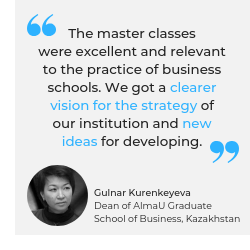About
 Leading the Way in Management Development takes place on demand. If you are interested in this workshop, contact Aigerim Kaumenova, CEEMAN Director at aigerim.kaumenova@ceeman.org, to discuss possible dates.
Leading the Way in Management Development takes place on demand. If you are interested in this workshop, contact Aigerim Kaumenova, CEEMAN Director at aigerim.kaumenova@ceeman.org, to discuss possible dates.
In the fast-changing world of management development, it is crucial that leadership teams of educational institutions share the same perception of the main challenges and strategy, are able to develop comprehensive plans for dealing with external and internal changes, and work efficiently together to implement these plans.
This strategic retreat, designed by a group of experienced presidents and deans from CEEMAN member institutions, is intended to help top leadership teams of management schools (deans or directors attending with their top team members) to stress-test and fine-tune their strategies and plans. This is achieved through a series of Masterclasses on key issues that management development institutions are facing, extensive faculty coaching and peer-to-peer feedback.
The programs' name Leading the Way in Management Development, has been chosen with three underlying beliefs in mind:
- Measuring up to best practices, whether local or global, is not enough. The new gold standard must be to lead the way.
- In a world where both management and management development are continuously faced with a host of new challenges, innovation and change must be key components of any institution's future strategy and plans.
- CEEMAN institutions, with their unique experience in the world's rising economies, can and should take the lead on the world stage.
Participant teams are able to progressively stress-test their strategies and plans:
- first, in terms of their strategic integrity, market potential, and marketing effectiveness;
- second, in terms of anticipated changes in both management itself and in management development;
- and third, in terms of what needs to be done to realign teaching, research, faculty policies, and organization for the future.

Who should attend?
Deans/directors with 3-5 members of their core management team e.g. associate deans/vice-presidents for academic affairs, research, or major programs, CFOs, heads of administration, etc.
Why attend?
Teams should expect the following main "take-homes":
- A revised perception of the main challenges ahead as well as a thorough rework of strategies and plans to deal with these.
- A shared understanding and commitment by the whole team to tackle these issues and implement the needed changes.
- Very substantial and lasting individual and team learning about the leadership challenges confronting all management development institutions worldwide, and how to think about them and deal with them given the particularities of one’s own institution.
Taken together, these take-homes can be expected to result, for most if not all teams, in a major shake-up and reset of both direction and change plans. The workshop can also be considered as important preparation for the world's leading accreditation or re-accreditation schemes. Therefore, return-on-investment, given the relatively low cost of program participation, can reasonably be expected to be very significant.
What makes Leading the Way in Management Development different?
- To have maximum impact in practice, the program is directed at top management leadership teams, not just at the dean/director/president only.
- A daily series of Masterclasses which prompt progressive reworking of each participating institution’s strategy and plans
- A leitmotif of the whole workshop is to learn how to combine excellence with relevance in both teaching and research. Relevance is becoming an imperative for management development worldwide and CEEMAN, through its core membership in the world's rising economies, is committed to taking the lead in this long-overdue course correction.
- The belief of CEEMAN and Leading the Way faculty is that it is precisely institutions in the world's rising economies that are likely to lead the way in both management and management development in the future. This program thus provides a unique opportunity to share experience, to learn from each other, and to forge these new paths together. This collaboration is expected to extend into the future with CEEMAN acting as a catalyst.
- Take-home is primarily a reconsidered and reworked plan and 2-3 high-priority strategic initiatives to take each participating institution to the future, as well as team commitment to make the needed changes happen.
- The potential exists for a very high return on investment for participating institutions. Once take-home plans are put into practice, the financial, quality, and reputational returns are likely to far exceed the relatively small fee investments.

Faculty
The workshop is lead and taught by Professor Derek F. Abell, who also coaches the teams.
Fees
Participating teams may vary in number from 4 to 6 members. The dean/director/president must always be included as a leadership team member.
Depending on the team size and the number of teams, fees start at €5,700 per team.for CEEMAN members and €6,500 per team for non-members.